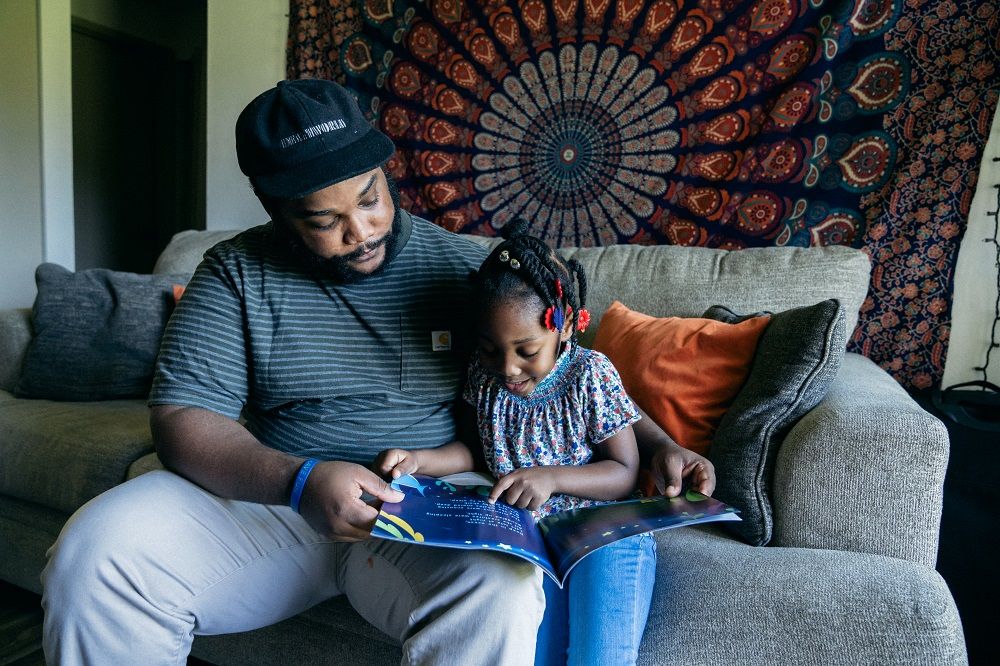Quality Time And Play With Kids
Key points:
- There are many benefits to spending quality time with your kids – both for you and for them.
- One way to spend quality time is by playing together.
- Child-centered play is a great way to spend quality time with your child, while giving them independence and your full attention.
- Different play activities will be appropriate for toddlers, preschool aged children and school aged children.
Life’s hectic – we get it. There’s work, chores, walking the dog, getting the car serviced, going to the gym and if you’re lucky maybe even making eye contact with your partner once in a while. Time is of the essence. But time with you is exactly what your kid(s) crave.
Setting aside quality time to play with your children has so many benefits, for them and for you.
- It builds your connection
- It promotes their development
- It helps fill their emotional cup
- It allows you to learn about, and enjoy, this awesome small person.
The concept of ‘quality over quantity’ applies when it comes to spending time with your kids. Quality time can be as brief as five minutes, but if you can spend that time with your child every day, they’ll get so much out of it.
Why is quality time important?
You’re already doing an awesome job being a parent. But as much as your kids need you to make their meals, do their laundry, put their new toys together (instruction manual optional) and throw them in a bathtub once in a while, what they need from you more than anything is you.
There’s nothing like quality time with Mum or Dad. When you make it an intentional part of your day – setting aside work commitments, chores and yes, even your phone – it allows you to show that you’re listening and genuinely interested in your children.
There are lots of ways you can spend quality time with your children. You can read books, do art activities, bake, go for a walk or throw a ball around. But experts agree that you can’t really beat the developmental benefits (and let’s not ignore the fun) that comes from playing.
Why is it important to play with my children?
Play is a great way to spend quality time with your kid(s). Not only does it allow you to connect, talk to each other and have a good laugh, it’s also a key way in which children learn and develop.
It helps them improve cognitive skills
Playing involves thinking. You can see it in your child’s eyes when they’re calculating how to build a tower of blocks. They’re assessing and solving problems, organizing options, and making decisions. It’s incredible to watch. And all of this contributes to improving cognitive skills for your child – skills that’ll transfer to all areas of life.
It helps them improve emotional development
Playing with Mom or Dad makes kids feel happy and safe. It gives them a sense of control they don’t usually experience, and builds their sense of independence. Play has been shown to reduce frustration and make kids feel calmer (which means less tantrums).
Activities that require imagination and creativity are great at improving emotional development in children, boosting their self-esteem and confidence. You’ll see as your child gets older how they start to display more complex emotions, and begin to use language around why they feel certain ways while playing.
It helps them improve social skills
Improving social skills in children is so important for their development. They won’t get too far in life without learning to interact with other people. Play can help children develop important skills like taking turns, sharing, listening to others, co-operating and developing friendships.
It helps them improve physical development
Play can take many forms, but it often requires motor skills. Whether you’re throwing a ball, having a mid-afternoon dance-off, or cooking up a batch of muffins, you’ll be improving physical development in your child through active (and sometimes delicious) play.

What is child-centered play?
You can actively encourage your child’s growth and development by assisting them in what’s called ‘child-centered play’. This is just one way to play with your children and it goes hand-in-hand with the concept of quality time. Make space for child-centered play with your kids on a regular basis, ideally once a day.
Child-centered play is basically what it sounds like: time that you set aside for your child to be in control. You let them decide what activity they’d like to do, then give them your undivided attention and encouragement. You follow their needs during play, letting them run the show rather than telling them what to do, suggesting activities or asking questions.
If your son or daughter likes to be in charge and rule the roost (aka they boss other kids around), child-centered learning will be particularly beneficial for them. It puts them in the driver's seat and gives them a set time and place that they’re in charge, so they’re less likely to be bossy with parents, peers and siblings.
So how does it work?
How to spend quality time with kids
Quality time with your child is about giving them your full attention, and letting them choose how to spend the time with you. Maybe you’re not used to letting go of control. That’s okay, it’s not for too long and it’s definitely not designed to let them run amok. Experts suggest avoiding video games, toy guns or swords, and anything that could turn into rough or aggressive play – that’s not what this time is for.
Set aside around five to ten minutes per day (per child) for one-on-one time. You can call it ‘Special Time’! or ‘Dad/Mom Time’, whatever works.) Let your child choose from several age-appropriate activities (see some ideas below). Then just follow their lead.
Here are some directions for how to do this effectively:
- Imitate what they’re doing. So if your child is building a tower, you would build one too.
- Reflect back what they say. For example, if your child says “I’m building a fire station to fit in all the trucks”, you repeat that back to them.
- Give commentary, in the same way you would if you were describing the action at a cricket game. For example, you may describe exactly what your child is doing: “You’re building a tall fire station, with yellow and blue blocks. Now you’re adding people into the fire station”. This way your child is fully in charge of play, and you’re responding to them rather than suggesting what they should do.
- Use lots of descriptive praise for their creativity, play skills, turn-taking, and sharing.
Try to slow down and let your kid go at their own pace. Remember, it takes children longer to make decisions than it does for us. Yes, it can be frustrating watching them stack a tower for five minutes straight, but try not to step in and take over.
Tips for structuring quality time
- Include around five to ten minutes of quality time into your daily routine (per child).
- Pick a time of day that you can commit to regularly. Put a reminder in your calendar or phone to make quality time consistent.
- Explain what quality time is to your child(ren).
- If you have a partner, encourage them to have their own separate quality time.
- Offer younger children two or three activities to choose from.
- Make sure you spend equal time with each child, so it’s fair (and to avoid unnecessary sibling conflict)
- Avoid critical or sarcastic comments, giving instructions, and focusing on who’s winning or losing.
If your child misbehaves during your quality time, don’t give that behavior your attention. Instead, watch for opportunities to praise good behavior, and implement discipline strategies like time-out if needed.

How should I play with my child?
How toddlers play
Play for toddlers involves starting to differentiate colors, shapes, textures and sizes, which is a great basis for mathematical thinking. While they may not perform imaginative play yet, they like to use their hands to figure things out.
You can practice child-centered play by offering a range of activities, such as:
- Puzzles
- Water play
- Books
- Building blocks
- Songs with actions (think: Heads, Shoulder, Knees and Toes)
- Sorting activities
Let your toddler decide what they’d like to do, and offer encouragement for small achievements. For example, “Nice job, you found the red block!”
How preschoolers play
By around four years old, your child will most likely have nailed rudimentary physical skills and be able to kick and throw balls. They can probably even distinguish sides of the body. (“Kick it with that leg, then the other one!”) This is a very imaginative age, and kids may make up weird stories or have imaginary friends. Their fine motor skills may have developed to the point they can start to hold a pencil and draw specific shapes. Preschoolers can also begin to describe their feelings and emotions during play.
You can encourage child-centered learning with preschoolers with activities such as:
- Playing with balls
- Using puppets and dress-ups to act out stories
- Doing puzzles together
- Dancing
- Engaging in messy play (which is exactly what it sounds like… getting messy with sand, dirt, mud, water, clay etc. A nightmare to clean up? Yes. But it’s so good for their development)
- Creating picture collages
- Playing with musical instruments (even simple ones like an egg shaker)
While the World Health Organisation (WHO) advises against screen time for children under two years old, you may start to introduce your preschooler to screen-based activities like online puzzles or drawing. Don’t overdo it, though — WHO guidelines suggest keeping it to one hour max at this age. And as we mentioned earlier, try to avoid violent video games.
How school-aged kids play
Once kids are in school, they’ll be surrounded by lots of other children all the time. Playing with others will be a regular part of their day, and they’ll be able to play more games with structured rules and limitations, like board games, simpler video games and team sports.
You could spend quality time with school-aged children on activities like:
- Making cubby houses and obstacle courses
- Doing crafts
- Cooking
- Playing word games like ‘I spy’.
At this age, you might just ask your kid what they want to do and let them think of an activity themselves.
Whatever you end up doing together, just have fun with your awesome small humans when spending time with them. They’re obviously great (they’re yours, after all), so take the time to switch off from all the other parts of life and simply enjoy being their parent. It might sound cheesy, but they won’t stay young forever and we promise you will cherish the time you spend with them now.
Want to learn more?
Movember launched Family Man to improve the confidence and mental health of dads.
Learn how to master kick-ass parenting strategies by getting started with Family Man. It’s an interactive parenting video series that's expert-backed and funded by Movember.
If research is your thing take a closer look at the evidence behind Family Man.
Or learn more before diving in.